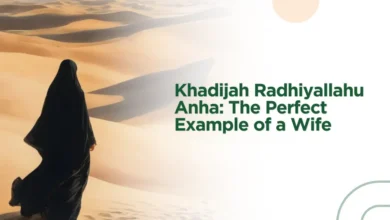Balance Between Worldly Life and Hereafter According to Prophet Muhammad ﷺ
In everyday life, achieving balance between worldly life and the hereafter is a central principle taught by Prophet Muhammad ﷺ. He demonstrated how Muslims should live a life with full responsibility towards worldly needs while not neglecting spiritual duties and the afterlife. This article will discuss how Prophet Muhammad ﷺ applied this balance in his life and how we can emulate this principle.
The Concept of Balance in Islam
Islam teaches that this worldly life is temporary and that the primary goal of a Muslim is to attain happiness in the hereafter. However, this does not mean that worldly life should be neglected. Prophet Muhammad ﷺ emphasized the importance of striving for worldly well-being, as long as it is done within the framework of Islamic teachings.
Furthermore, in the Qur’an, Allah says:
“وَابْتَغِ فِيمَا آتَاكَ اللَّهُ الدَّارَ الْآخِرَةَ وَلَا تَنسَ نَصِيبَكَ مِنَ الدُّنْيَا…”
“And seek, through that which Allah has given you, the home of the Hereafter; but do not forget your share of the world…”
(Surah Al-Qasas: 77)
This verse emphasizes that while the main focus of a Muslim should be on the Hereafter, it does not mean that worldly pleasures should be neglected. The balance between striving for the Hereafter and fulfilling worldly needs is a hallmark of Islamic teachings.
Balance in Worship and Daily Activities
One of the prime examples of this balance is seen in the daily routine of Prophet Muhammad ﷺ. He consistently divided his time between worship, work, and family responsibilities. Prophet Muhammad ﷺ did not spend all his time in the mosque for worship but also worked hard to provide for his family. Moreover, he taught his followers to maintain physical health through exercise, adequate rest, and a healthy diet.
In the context of worship, Prophet Muhammad ﷺ often advised his companions not to go to extremes. In a hadith narrated by Bukhari and Muslim, Prophet Muhammad ﷺ admonished a companion who planned to fast continuously without breaking it and to pray all night without sleeping. He ﷺ said:
“إِنَّ لِجَسَدِكَ عَلَيْكَ حَقًّا، وَإِنَّ لِعَيْنِكَ عَلَيْكَ حَقًّا، وَإِنَّ لِزَوْجِكَ عَلَيْكَ حَقًّا.”
“Indeed, your body has a right over you, your eyes have a right over you, and your wife has a right over you.”
(Narrated by Bukhari, no. 5199; Muslim, no. 1159)
This hadith illustrates that maintaining a balance between worship and physical needs is highly important in Islam. Prophet Muhammad ﷺ not only emphasized the spiritual aspect but also cared for the physical well-being of his companions.
This balance in worship is also reflected in how Prophet Muhammad ﷺ treated his family. He ﷺ was a loving husband and father who spent time with his family despite being busy with the responsibilities of dawah (preaching) and leading the Muslim community. This shows that fulfilling religious duties and taking care of one’s family can go hand in hand if done wisely.
Balance in Good Deeds and Enjoying Life
Prophet Muhammad ﷺ also demonstrated that a Muslim should perform good deeds for the Hereafter without forgetting the permissible pleasures of worldly life. He ﷺ once said:
“ما من مسلم يغرس غرسا، أو يزرع زرعا، فيأكل منه طير أو إنسان أو بهيمة، إلا كان له به صدقة.”
“No Muslim plants a tree or sows seeds, and then a bird, or a person, or an animal eats from it, but it is regarded as a charitable gift for him.”
(Narrated by Bukhari, no. 2320; Muslim, no. 1553)
This hadith shows that worldly activities like farming can have spiritual value if done with good intentions. Balance in performing good deeds and enjoying life is part of the sunnah taught by Prophet Muhammad ﷺ.
On the other hand, Prophet Muhammad ﷺ emphasized the importance of gratitude and enjoying Allah’s blessings in this world. He often enjoyed good food, interacted with his companions, and cherished moments of happiness with his family. However, all of this was done while maintaining the principle of moderation and not being excessive.
In a hadith narrated by At-Tirmidzi, Prophet Muhammad ﷺ said:
“إِنَّ اللَّهَ يُحِبُّ أَنْ يُرَى أَثَرُ نِعْمَتِهِ عَلَى عَبْدِهِ.”
“Indeed, Allah loves to see the effects of His blessing on His servant.”
(Narrated by At-Tirmidhi, no. 2819; graded as hasan by At-Tirmidhi)
This hadith encourages Muslims to show gratitude for Allah’s blessings by enjoying them, but within the bounds of what is halal (permissible) and not excessive. Prophet Muhammad ﷺ was known for his grateful nature; he never overlooked even the smallest of Allah’s blessings.
Also read:The Power of Knowledge: Achieving Success in This World and the Hereafter
Implementing Balance in Modern Life
In the fast-paced and challenging modern life, following the balance taught by Prophet Muhammad ﷺ becomes increasingly relevant. Many people are caught up in their hectic work schedules, neglecting their religious obligations or even their physical and mental health. On the other hand, some focus too much on worship without considering their worldly responsibilities.
To achieve this balance, we should follow the example set by Prophet Muhammad ﷺ. Proper time management, allocating enough time for worship, work, family, and self-care, are initial steps we can take. By doing so, we can achieve true happiness in both this world and the Hereafter.
Conclusion
From the life of Prophet Muhammad ﷺ, we learn that balance between worldly life and the Hereafter is the key to achieving a blessed and meaningful life. This principle guides us to live a life that considers worldly needs while staying focused on our ultimate goal, which is happiness in the Hereafter. By emulating the balance shown by Prophet Muhammad ﷺ, we can live a life that is balanced, full of blessings, and in accordance with the teachings of Islam.
Also read:Principles of Generosity in Trade in the Hadith of Prophet Muhammad ﷺ

Referensi
- Islamway. (n.d.). الموازنة بين متطلبات الروح والجسد في هدي النبي محمد صلى الله عليه وسلم. Retrieved from https://ar.islamway.net
- Islam Digest. (n.d.). Nabi Muhammad Ajarkan Prinsip Keseimbangan. Republika. Retrieved from https://islamdigest.republika.co.id
- Islamweb. (n.d.). التوازن بين السعي في مصالح الدنيا والعمل للآخرة. Retrieved from https://www.islamweb.org
- Mawdoo3. (n.d.). مظاهر التوازن في شخصية الرسول. Retrieved from https://mawdoo3.com
- الدرر السنية – الموسوعة الحديثية – شروح الأحاديث. (2024). Dorar.net. https://dorar.net/hadith/sharh/8101
- الدرر السنية – الموسوعة الحديثية – شروح الأحاديث. (2024). Dorar.net. https://dorar.net/hadith/sharh/84018
- الدرر السنية – الموسوعة الحديثية – شروح الأحاديث. (2024). Dorar.net. https://dorar.net/hadith/sharh/61786







